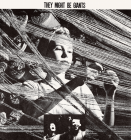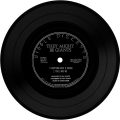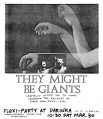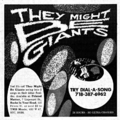Wiggle Diskette
 |
Demo by They Might Be Giants | |||||
| First released | March 30, 1985 Release details / collectors: Show | Hide |
Tracks | 2 | Last demo | 1984 Promotional Demo Tape | |
| Label | TMB Music <850647S> | Length | 4:22 | Next demo | 1985 Promotional Demo Tape | |
The Wiggle Diskette is They Might Be Giants' first official release, a one-sided circular 7" flexi-disc released on March 30, 1985.
Contents
Description[edit]
Background[edit]
Since the early 1980s, They Might Be Giants had been creating home recordings of their songs for tape distribution and live performance, but had not yet created an official release under their name. The idea for the band to release a flexi-disc had been considered as early as 1981, when Flansburgh and Linnell both moved into the same apartment building[1] and began recording music together[2]:
JF: We lived up and down stairs from each other, and we started working together. We made little tapes, and we talked about making a flexi-disc. That was our big dream.
JL: One day, one day, we'll make a flexi-disc…
JF: And we had this big plan. We were going to release "Cowtown" and "My Father's Son".
After the duo were forced to move away from their shared apartment and recording space in Fort Greene[3], they would begin to experiment with new musical approaches to instrumentation and percussion. One of these experiments was with drum machines, which would begin to be used in place of the pre-recorded drum tracks and live drum kit the duo had access to on their previous recordings. Although the band had been creating synthesized drum sounds using a Shure SM57 microphone and John Linnell's MicroMoog synthesizer[4], the band's first official drum machine purchase would be the BOSS Dr. Rhythm DR-110, which provided drum sounds for the band's 1984 Promotional Demo Tape, as well as various early recordings for Dial-A-Song, such as a cover of The Rose Garden's "Next Plane To London"[5][6].
Around mid-1984[7], the band was approached by Chris Butler of The Waitresses, who would lend them a drum machine that he owned. The drum machine was an Oberheim DMX, which was then priced at around $2,800 USD. John Flansburgh would recall this interaction with Butler in 2022[8]:
[Chris Butler] was like "Listen, I've got a drum machine if you need to borrow a drum machine." This is back when drum machines got, like, $2,500 and John and I were living on falafel and ramen, and he just was so generous and so supportive, and he didn't want to produce us, he didn't want to be our friend. He just thought we were doing an interesting project, and he was so generous.
Because of his involvement, Chris Butler is credited on the Wiggle Diskette with drum programming, despite not having performed on the recordings featured on the flexi-disc[9].
Recording[edit]
Not much is known about the recording sessions They Might Be Giants had with Butler's Oberheim DMX, although Flansburgh recalls that the drum machine was borrowed for a "fevered weekend"[10] in 1984. It is also unknown how many songs the band recorded using the drum machine, although a few demos using the sounds on the DMX would appear on separate demo tapes. Demos featuring the DMX included "Everything Right Is Wrong", "You'll Miss Me", "Put Your Hand Inside The Puppet Head", "Rhythm Section Want Ad", "Cowtown", "Hell Hotel" and "The Biggest One". Sounds from the DMX can also be heard on an early backing track for "Mr. Me" at a 1985 live show.
As early as December 1984[11], the band was given access to record and mix their material after hours at Studio PASS (Public Access Synthesizer Studio) by engineer Alex Noyes, who is subsequently credited for engineering the Wiggle Diskette on the disc itself. Noyes was a college friend of producer Bill Krauss, who at that point had been working with the duo since 1983[12]. It was possible that the synthesizers heard on the Wiggle Diskette were recorded and mixed here, with the Johns recalling their time working at Studio PASS in the liner notes for Then: The Earlier Years[13]:
Working the lobster shift allowed us to take advantage of a lot of additional, unauthorized studio time. So much time, in fact, that there was real apprehension about crediting the studio as the site of the album's mixing. Usually Flansburgh and Bill Krauss would drink enough coffee to stay up the whole night and do most of the work, while Linnell and engineer Alex Noyes crashed on sofas amid the deafening combination of music and Flans and Krauss shouting over the mix.
Release[edit]
In a 1997 interview, John Linnell mentioned that the motivation behind the band creating a flexi-disc was to give their friends the opportunity to hear their recordings. The band found out that these discs were cheap to manufacture at under $0.10 per disc[14], and would print up to 1,000 copies at the Acetone Sound Sheet Company in Clearwater, Florida[15]. The songs chosen for release on the Wiggle Diskette were "Everything Right Is Wrong" and "You'll Miss Me", with Bill Krauss mentioning the reasoning behind these choices in a 2019 interview with the Don't Let's Start fan podcast[16]: "We would want contrast − we would want to not just have two songs that were 'the same', we'd want them to show each other off."
The cover art for the release featured a woman threading wool in a textile factory, with a small photo of the Johns at the bottom of the artwork and a modestly printed "THEY MIGHT BE GIANTS" at the top. The photo of the Johns was an early publicity photo that was taken circa. 1982 by Julie Kantner[17], who had previously played bass in John Flansburgh's college band The Turtlenecks. The source of the main photo is unknown, as well as the identity of the woman in the photo. Flansburgh vaguely recalled the source of the photograph on Tumblr in 2011[18]: "It's from a photo library I believe, [but I'm] not really sure of its source since it was in a huge publishing house that had many odd resources." When packaging the flexi-disc, it would mainly be put inside of brown sleeves, which were stamped with the phone number of the band's Dial-A-Song service.
The earliest known release date for the Wiggle Diskette was March 30, 1985, where its release would be celebrated at a "flexi-party" hosted by They Might Be Giants at Darinka. Because of the cheap price paid to manufacture the discs, a majority of the people at the event were handed out free copies to listen to[19], with extra copies being given away at a "post-flexi reception" show at 8BC on April 6, 1985. Gary Ray, owner of Darinka, would comment in a 2020 interview with the Don't Let's Start fan podcast that the release party was a "really big deal"[20], while Flansburgh would comment on Tumblr in 2022 that "it was a ton of fun and kind of exciting"[21]. On the day of the show, some copies of the Wiggle Diskette were bagged, scotch taped and stapled to telephone poles, street signs and lampposts around Manhattan[22][23], with other copies being nailed to trees around Tompkins Square Park[24].
After the release party, the Wiggle Diskette would be primarily sold through the bookstore and arts organization Printed Matter, the now-defunct record store Rocks In Your Head, and by mail order at $2 to John Linnell's apartment. Copies of the flexi-disc were also distributed in the band's earliest press kits, where they would be packaged in amongst publicity photos, promotional demo tapes, as well as a Dial-A-Song spinner. British disc jockey John Peel was known to have received one of these press kits[25], and would play "Everything Right Is Wrong" from the disc on his BBC Radio 1 show Sometimes Peel in 1985[26]. The Wiggle Diskette was also positively reviewed in New Musical Express in August 1985 and Oh No! Noho! in September 1985.
After the release of the Wiggle Diskette, a new demo of "You'll Miss Me" would appear on the band's 1985 Demo Tape later in the year, while "Everything Right Is Wrong" would be re-recorded for release on the band's debut LP in 1986. "You'll Miss Me" was re-recorded a final time with a different arrangement, and would appear on the band's second LP Lincoln in 1988. John Peel would also play the Wiggle Diskette recording of "Everything Right Is Wrong" on BBC Radio 1 again on August 14, 1990[27], a few months after the release of the band's third album Flood.
Inspired by working with Chris Butler's Oberheim DMX, Flansburgh would purchase his first ever drum machine, the Yamaha RX15, which he recalled purchasing from a "grey market" on Canal Street between Fall and Winter 1984[28]. After experimenting with the drum machine on "Counterfeit Fake"[29], the Yamaha RX15 − and its other model, the RX11 − would become an integral part of the band's recordings between 1985-1988, where it would be used for songs on the 1985 Demo Tape, They Might Be Giants and the initial mixes of Lincoln[30][31].
Track listing[edit]
| # | Title | Length | Lyrics | Guitar Tab |
|---|---|---|---|---|
| 1 | Everything Right Is Wrong | 2:25 | 
|
N/A |
| 2 | You'll Miss Me | 1:57 | 
|
N/A |
Trivia[edit]
- Early releases of the Wiggle Diskette came with an extra "Norwegian for Travellers" Berlitz disc.[32]
- Despite taking the photo of the Johns used for the disc's cover artwork, Julie Kantner is not credited on the release for photography. She would be credited, however, in a spotlight article on the band published in the December 1984/January 1985 issue of The Bob.
- After John Peel's second broadcast of "Everything Right Is Wrong" in 1990, he read out a letter that the band had sent him, along with the disc, in 1985. The letter mentioned their plans to perform in London in September of that year, as well as a 12" EP to be released in the U.S. around the same time. Both of these plans were scrapped, and have not been mentioned elsewhere[33].
